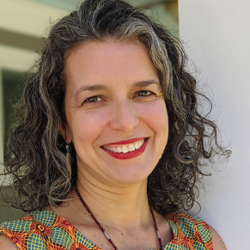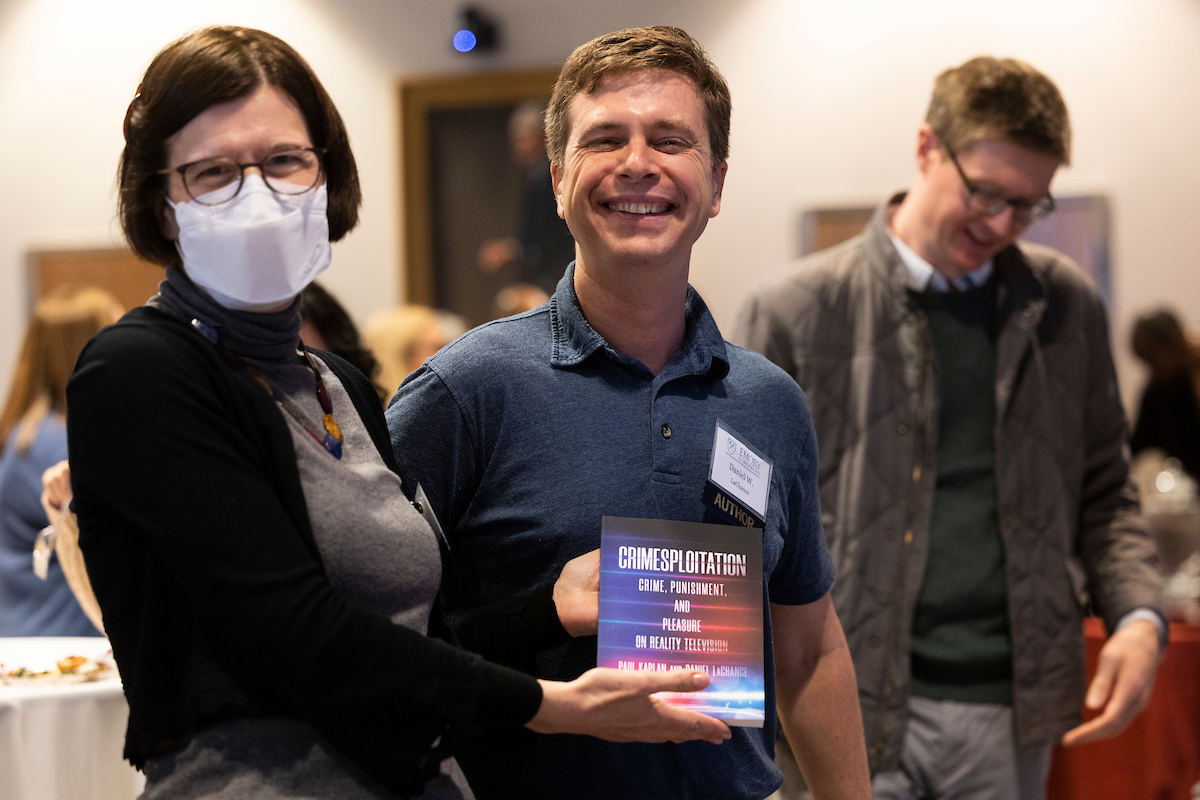Dr. Joseph Crespino, Department Chair and Jimmy Carter Professor of History, recently appeared on the Georgia Public Broadcasting show Political Rewind. On a panel that included Jim Galloway (former political columnist, The Atlanta Journal-Constitution), Matthew Brown (The Washington Post), and Tia Mitchell (The Atlanta Journal-Constitution), Crespino discussed how the insurrection at the U.S. capitol on Jan. 6, 2021 will be remembered. Crespino is an expert of the political and cultural history of the twentieth-century United States and of the U.S. South since Reconstruction. Listen to the full conversation, hosted by Bill Nigut, here: “Political Rewind: The legacy of January 6th; McCarthy faces a fourth day of House votes.”
Month / January 2023
Candido and Chira Receive Social Justice Grant through Emory Provost Office
Two History Department faculty members have received a grant from a program within the Emory Office of the Provost designed to foster research and scholarly work that advances social justice. Dr. Mariana P. Candido, Associate Professor, and Dr. Adriana Chira, Assistant Professor, are collaborating on a project titled “Land Dispossession, Inequality and the Legacies of Slavery in Africa and Latin America.” The project envisions the creation of an open-access digital resource on these themes, two undergraduate courses at Emory, and trips to Cuba and Puerto Rico. Read a fuller description of the initiative below, along with other projects funded through this program: “Emory awards funds for five faculty projects focused on arts and social justice.”
“This project, conducted in collaboration with Mariana Dias Paes at the Max Planck Institute for Law and Legal Theory, will study land dispossession in Africa and Latin America and establish an open-access digital resource that shares critical historical documents, transcripts, legal papers and other records relating to the topic. The grant also funds the creation of two undergraduate courses on the politics of development, rural transformation and food sovereignty that will combine a trip to Puerto Rico and Cuba with in-class instruction.“
Andrew G. Britt (PhD, ’18) Publishes Article in ‘Journal of Latin American Studies’
Dr. Andrew G. Britt, a 2018 alumnus of the History doctoral program, recently published an article in the Journal of Latin American Studies. Titled “Spatial Projects of Forgetting: Razing the Remedies Church and Museum to the Enslaved in São Paulo’s ‘Black Zone’, 1930s–1940s,” the piece excavates the history of the former headquarters of Brazil’s Underground Railroad and a longtime museum to the enslaved. The article emerged out of Britt’s dissertation, which was advised by Drs. Jeffrey Lesser and Thomas D. Rogers. Britt is Assistant Professor of History and Digital Humanities at the UNC School of the Arts. Read the abstract of the article below along with the full piece.
“In the shadows of a Shinto torii (gateway) in São Paulo’s ‘Japanese’ neighbourhood rests the city’s first burial ground for enslaved Africans. Recently unearthed, the gravesite is one of the few visible remains of the Liberdade neighbourhood’s significance in São Paulo’s ‘Black zone’. This article excavates the history of the nearby Remedies church, the headquarters of Brazil’s Underground Railroad and a long-time museum to the enslaved. The 1942 demolition of the Remedies church, I argue, comprised part of a spatial project of forgetting centred on razing the city’s ‘Black zone’ and reproducing São Paulo as a non-Black, ethnically immigrant metropolis.”
The Feast of Words Event Celebrates Books by Emory Faculty, including Seven Historians
For the last 19 years the Center for Faculty Development and Excellence, Emory Libraries, and the Emory Barnes and Noble Bookstore have hosted the Feast of Words, an annual event to celebrate the Emory faculty members who have written or edited books in the prior year. The December edition of the festival featured 89 books, including seven by historians at Emory, published between September 1, 2021, and August 31, 2022. Read the titles of the books published by Emory historians below, along with the full list here: “Celebrating Faculty Authors.”
- Tonio A. Andrade. Het laatste gezantschap: De Nederlandse missie van 1795 en de westerse betrekkingen met China. Robert Vernooy, trans. Querido.
- Anthony A. Briggman (Theology) and Ellen Scully, eds. New Narratives for Old: The Historical Method of Reading Early Christian Theology. Essays in Honor of Michel René Barnes. Catholic University of America P.
- Adriana Chira. Patchwork Freedoms: Law, Slavery, and Race beyond Cuba’s Plantations. Cambridge UP.
- Astrid M. Eckert. Zonenrandgebiet. Westdeutschland und der Eiserne Vorhang. Thomas Wollermann, Bernhard Jendricke, and Barbara Steckhan, trans. Ch. Links.
- Daniel LaChance and Paul Kaplan. Crimesploitation: Crime, Punishment, and Pleasure on Reality Television. Stanford UP.
- Pablo Palomino. La Invención de la Música Latinoamericana. Fondo de Cultura Económica.
- Polly Price. Plagues in the Nation: How Epidemics Shaped America. Beacon.
Lipstadt Addresses Antisemitism as Part of ‘Thought Leader Series’
Dr. Deborah E. Lipstadt, Dorot Professor of Modern Jewish History and Holocaust Studies and the U.S. State Department’s special envoy to fight antisemitism, recently discussed her work and global antisemitism as part of Emory’s Office of Diversity, Equity, and Inclusion’s Thought Leader Series. Ambassador Lipstadt was interviewed by Dr. Carol E. Henderson, Vice Provost for Diversity and Inclusion. The Thought Leader Series identifies opportunities to engage in conversation with some of the foremost thinkers at Emory and more broadly across the world who can provide educational awareness around topics and issues that create barriers to experiencing a more inclusive Emory, and a more humane and just society. Lipstadt is Associated Faculty in the History Department. Watch the full conversation above or on YouTube at: “Thought Leader Series | Antisemitism: A Conversation w Dr. Deborah Lipstadt & Dr. Carol E. Henderson.”
TIJS Highlights Recent PhD Graduate Anastasiia Strakhova

Emory’s Tam Institute for Jewish Studies (TIJS) published a feature story on recent doctoral graduate student Anastasiia Strakhova, whose work TJIS supported throughout her graduate career. Strakhova completed her dissertation, titled “Selective Emigration: Border Control and the Jewish Escape in Late Imperial Russia, 1881-1914,” in 2022 under the advisement of Dr. Eric Goldstein and Dr. Ellie R. Schainker. This spring Strakhova is a Postdoctoral Fellow in the Center for Jewish Studies at Duke University. Read an excerpt from the TJIS feature below, along with the full article: “Recent TJIS Graduate Highlight: Anastasiia Strakhova.”
“My research interest evolved gradually,” Dr. Anastasiia Strakhova explains when asked about her scholarly development. After getting her BA in her home city of Kharkiv, Ukraine, and then her MA from the Central European University in Budapest, Hungary, Dr. Strakhova traveled to the United States to continue her education. While studying Yiddish in New York, Dr. Strakhova found her curiosity about Jewish migration. “I was so fascinated about the attachment that Jews felt to the United States, and the romanticization of the old country… And then I got very interested in seeing the archives and reading about the way that people were living [at that time in history].” Dr. Strakhova’s dissertation addresses late Imperial Russian migration policies through the prism of racialization and criminalization of Jews.



